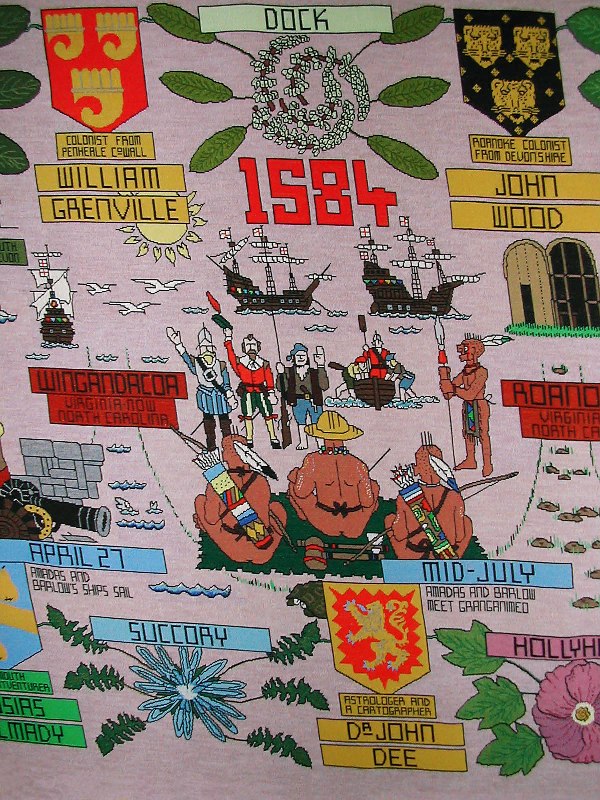|
Back to 1584 Menu

Hackluyt like Dee is another university man, though not from Cambridge but Oxford having studied at Christ Church college. He is an expert mathematician, a passionate and profound geographer who will go on to become one of the greatest collectors
of voyage accounts and maritime journals that has ever lived. His future chronicles known as Hackluyt’s Voyages
will be based on records extracted from ship’s logs and seafarers’ stories and be of enormous importance
for later expedition commanders.
In another work, Discourse of Western Planting Hackluyt argues not only that it is England’s
duty to bring the glories of civilisation and Christianity to North America but colonisation would be good for trade by obtaining
from her settlements commodities which England cannot produce herself and at present has to import from the continent. This
will reduce many tariffs and taxes. Thus he has put forward some ideas to Amadas and Barlow to achieve this object. For example,
when they go ashore for the first time and meet the natives they should wear woollen caps in order to interest them to start
trading in woollen garments in exchange for precious metals and minerals.
After an uneventful voyage across the north Atlantic the English
land on Roanoke Island (in today’s North Carolina) and in the main scene they are pictured
being welcomed by the first native Americans they encounter. Among the potential colonists wading ashore are William Grenville
and John Wood. The former is a member of the famous Grenville family and he hails from Penheale which is 3 miles west of Launceston.
The latter’s home is at Orchard near Lewdown in Devon. They listen as Amadas and Barlow, using sign language seek to
find out the name of the country from Granganimco the Chief who sits in the centre of a mat with a brave either side of him.
“Wingandacoa”
is the Chief’s hearty reply which really means “You wear good clothes”. The English will not find out their
mistake for ages afterwards.
Granganimco, as pictured is wearing a metal hat in the shape of an upturned dish. It gleams in the sunlight
making the English think that it could be gold. If so it would mean that there are mines in the vicinity.
They therefore try to persuade the Chief to take it off to show them. Very wisely he declines and the colonists don’t
press the matter any further at this stage, so the meeting goes off well, with no hostility.
|
 |
|
|
|
 |
|

DOCK Lapathum. ‘The roots boiled til they be very soft,
and stamped with barrowes grease, and made into an ointment helpeth the itch and all scurvie scabs and mangines’.
Gerard. HOLLYHOCK Malva hortensis. ‘The roots, leaves
and seeds serve for all those things for which the wilde Mallowes do’. Gerard.
|
 |
|
|
|

